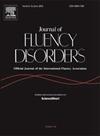Jordanian healthcare workers’ attitudes toward stuttering and people who stutter
IF 2.1
3区 医学
Q1 AUDIOLOGY & SPEECH-LANGUAGE PATHOLOGY
引用次数: 0
Abstract
Background
Studies that have the attitudes of healthcare workers toward stuttering and people who stutter (PWS) in different parts of the world and in Jordan mainly focused on SLPs. However, no studies have examined Jordanian healthcare workers’ attitudes in general. Aim: This study explored the attitudes of Jordanian healthcare workers toward stuttering and PWS using the Public Opinion Survey of Human Attributes-Stuttering (POSHA-S) and compared them to each other and to people on the POSHA-S database, people from the same culture (i.e., Middle Eastern) and Jordan. Methods: 241 healthcare workers in Jordan were invited to answer the Arabic version of the POSHA-S online. They were divided into six groups, i.e., doctors, pharmacists, speech-language pathologists (SLPs), occupational and physical therapists (OTs and PTs), nurses, and other health professionals. ANOVA and post hoc tests were utilized to analyze the data. Results: The overall stuttering score for the whole sample of the study was relatively low compared to the POSHA-S database, but slightly positively higher than the scores of the general population from the same culture and Jordan. SLPs and OTs and PTs had the highest overall stuttering scores. Group mean differences were significant between SLPs and the other groups. Conclusions: Jordanian healthcare workers had low positive attitudes toward stuttering and PWS. SLPs’ higher positive attitudes than the rest of the healthcare workers might reflect their training and knowledge gained through working with PWS. However, there is still a need to raise awareness and knowledge about stuttering among all healthcare workers in Jordan.
约旦医护人员对口吃和口吃者的态度
背景:在世界不同地区和约旦,关于卫生保健工作者对口吃和口吃者(PWS)态度的研究主要集中在口吃者身上。然而,没有研究调查了约旦保健工作者的总体态度。目的:本研究利用人类属性-口吃公众意见调查(POSHA-S),探讨约旦医护人员对口吃和PWS的态度,并将其与他人以及POSHA-S数据库中的人、来自相同文化(即中东)和约旦的人进行比较。方法:邀请约旦241名卫生保健工作者在线回答阿拉伯语版POSHA-S。他们被分为六组,即医生、药剂师、言语语言病理学家、职业和物理治疗师、护士和其他卫生专业人员。采用方差分析和事后检验对数据进行分析。结果:与POSHA-S数据库相比,整个研究样本的总体口吃得分相对较低,但略高于来自相同文化和约旦的一般人群的得分。口吃者、口吃者和口吃者的口吃总分最高。slp组与其他组之间的组平均差异有统计学意义。结论:约旦医护人员对口吃和PWS的积极态度较低。特殊护理人员的积极态度高于其他医护人员,这可能反映了他们通过与特殊护理人员一起工作而获得的培训和知识。然而,仍有必要提高约旦所有卫生保健工作者对口吃的认识和知识。
本文章由计算机程序翻译,如有差异,请以英文原文为准。
求助全文
约1分钟内获得全文
求助全文
来源期刊

Journal of Fluency Disorders
AUDIOLOGY & SPEECH-LANGUAGE PATHOLOGY-REHABILITATION
CiteScore
3.70
自引率
14.30%
发文量
23
审稿时长
>12 weeks
期刊介绍:
Journal of Fluency Disorders provides comprehensive coverage of clinical, experimental, and theoretical aspects of stuttering, including the latest remediation techniques. As the official journal of the International Fluency Association, the journal features full-length research and clinical reports; methodological, theoretical and philosophical articles; reviews; short communications and much more – all readily accessible and tailored to the needs of the professional.
 求助内容:
求助内容: 应助结果提醒方式:
应助结果提醒方式:


